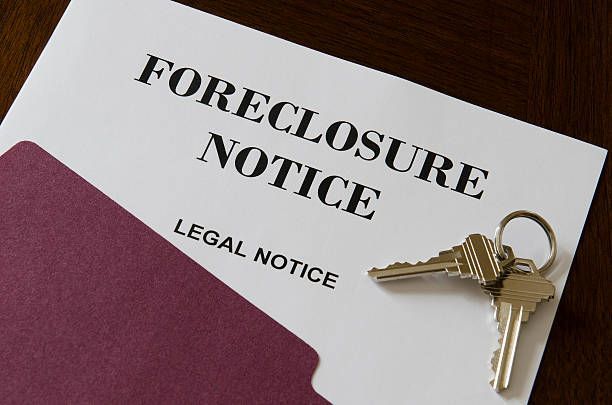Call or Text (601) 202-5183 for a FREE consultation!
Foreclosure 101- Navigating the complex world of foreclosure can feel overwhelming, especially when faced with the possibility of losing your home. As someone who's delved into this intricate process, I've come to understand the critical steps involved and the importance of acting swiftly. Foreclosure isn't an immediate event; it's a multi-stage process that begins with a loan default and can culminate in a sheriff sale or repossession.
Understanding foreclosure is crucial, whether you're a homeowner, buyer, or real estate professional. It starts with a missed mortgage payment, leading to a Notice of Default. If unresolved, the property may be auctioned off to recover the lender's investment. Knowing these steps can empower you to make informed decisions and potentially halt proceedings before they escalate. By demystifying the foreclosure process, I aim to provide you with the knowledge needed to navigate this challenging situation confidently.
What is Foreclosure?
Foreclosure is a legal process where a lender repossesses a property after a borrower fails to meet the mortgage terms. This usually occurs when a homeowner can't pay the mortgage, leading to either a foreclosure auction or, if unsold, the lender taking possession. The process stems from the borrower's initial agreement with the lender, secured by a promissory note and a mortgage. The mortgage acts as a trust deed, promising payment for the property, and if default occurs, the lender can initiate foreclosure to recover owed debt. Foreclosure isn't immediate; it follows a series of steps that can end with the property's sale, either through auction or via the lending institution reclaiming the asset. Successful foreclosure results in the lender being reimbursed through the sale proceeds, https://en.wikipedia.org/wiki/Foreclosurehile remaining funds might address other owed debts.
Understanding the Foreclosure Process
Navigating the foreclosure process requires familiarity with its stages. Each stage presents opportunities to address the situation before it escalates.
Missed Mortgage Payments
Foreclosure begins when multiple mortgage payments are missed. Most lenders offer options to rectify the situation early, as a single missed payment usually doesn't trigger foreclosure. If financial difficulties arise, it's crucial to contact the lender promptly to explore payment plan options.
Notice of Default
A Notice of Default is issued when a borrower defaults on their loan. This legal document marks the formal start of foreclosure proceedings. It informs the borrower that the loan is in default and provides a timeframe, typically 30 to 120 days, to resolve the debt or negotiate alternatives like a short sale.
Pre-Foreclosure
Pre-foreclosure is the grace period between receiving the Notice of Default and the potential sale of the home. During this time, borrowers have the chance to pay off the defaulted amount, negotiate with the lender, or sell the property via a short sale. Accessing housing counseling services can also provide crucial guidance.
Notice of Sale
Should the debt remain unresolved, lenders file a Notice of Sale, listing the property for auction. The auction's date, time, and location are specified, marking the final opportunity for homeowners to settle their debts and halt the foreclosure process.
Eviction
If the auction proceeds and the property is sold, the borrower loses homeownership rights, and eviction may occur. The former homeowner must vacate the property according to the timeline set by the new owner. Communicating with the lender or legal advisers can clarify any remaining financial responsibilities.
Options for Homeowners Facing Foreclosure
Exploring options can help homeowners navigate foreclosure challenges. Several strategies offer viable pathways for those facing financial difficulties.
Forbearance
Forbearance allows me to temporarily reduce or pause my mortgage payments. Many lenders offer forbearance when experiencing a short-term financial setback, providing time to regain economic stability. Federally-backed loans often include provisions for forbearance to assist homeowners during emergencies.
Loan Modification
A loan modification permanently changes the terms of my mortgage. By adjusting interest rates or extending the loan's term, I can decrease my monthly payments, making it more affordable. This option is beneficial if I've encountered significant life events impacting my financial capacity.
Refinancing the Mortgage
Refinancing replaces my existing mortgage with a new one, ideally at a lower interest rate. Lower monthly payments could result from better terms, offering a reprieve from financial strain. However, refinancing involves closing costs and may extend the debt duration, so evaluating the financial implications is essential.
Deed in Lieu of Foreclosure
A deed in lieu of foreclosure lets me voluntarily transfer my property to the lender. This option helps avoid foreclosure proceedings if selling the home isn't feasible. Though I might not pay the mortgage, I could still owe the difference between the home's value and loan balance.
Legal Assistance
Seeking legal assistance ensures I understand my rights and options. Professional advice helps navigate complex foreclosure legislation, potentially identifying solutions I hadn't considered. Legal experts provide guidance through negotiations and the foreclosure process, safeguarding my interests.
Consequences of Foreclosure
Foreclosure leads to several significant outcomes for homeowners. Losing a home is the most immediate effect, necessitating the search for new housing amidst financial and emotional stress. Another major consequence is the impact on credit, as a foreclosure stays on a credit report for seven years, complicating future credit applications. Many individuals face higher interest rates on loans and credit cards during this period. The loss of property and equity is another pressing issue, as homeowners not only lose their living space but also the investment they made in the home. This loss reduces overall wealth and long-term financial stability.
In some instances, homeowners still owe a deficiency if the foreclosure sale doesn't cover the full mortgage balance, depending on state laws. This debt can lead to legal actions like lawsuits or wage garnishment if unresolved. Beyond the financial repercussions, a foreclosure might affect employment and rental opportunities, as some employers and landlords review credit scores to evaluate applicants. A poor credit score can limit access to quality jobs and housing, further complicating the homeowner's recovery after foreclosure.
Avoiding Foreclosure
Understanding how to avoid foreclosure is crucial for homeowners facing financial challenges. Several strategies can help prevent the loss of a home.
Contact a Housing Counselor: Consulting with a certified housing counselor provides valuable guidance. These experts connect homeowners with resources tailored to their specific situations. Contact local HUD counselors or the HOPE hotline for 24/7 assistance.- Leverage Forbearance Programs: Forbearance offers temporary relief by pausing or reducing mortgage payments. Homeowners with federally-backed loans like Fannie Mae or Freddie Mac should explore this option.
- Modify Loan Terms: Discussing loan modification with lenders can lead to more manageable monthly payments. Extending the loan's amortization schedule may lower payments, helping homeowners stay on track.
- Consider a Deed-in-Lieu of Foreclosure: In some states, homeowners can transfer property ownership to the lender to avoid foreclosure. This approach avoids the foreclosure process and potential credit score impact.
- Communicate with Lenders: Early and open communication with lenders is essential. Many lenders prefer working with borrowers to find mutually beneficial solutions.
Exploring these options can make a significant difference, enabling homeowners to maintain their property and financial stability.
Conclusion
Understanding the foreclosure process is crucial for anyone navigating the complexities of homeownership. By recognizing the stages and exploring available options, homeowners can make informed decisions that might prevent foreclosure. It's essential to communicate with lenders early and seek professional advice to explore solutions like loan modifications or forbearance. Armed with the right knowledge and strategies, individuals can protect their homes and financial futures.
Contact
Atlas Property Investors today for a straightforward, hassle-free selling experience!

Call Us or Send us a Text to (601) 202-5183 to Get Started
Atlas is built on a strong foundation of 3 key Pillars: Integrity, Teamwork, and Helping Others. Our goal is to Make a positive impact on every individual we come in contact with. From tenants and contractors, to homeowners or investors, we abide by the 3 pillars that are the testimony to our success.
Atlas is a real estate company that is dedicated to helping homeowners get a fair offer on their house, regardless of its condition. We are proud to be able to help homeowners who want to sell quickly without going through a long and costly process. We believe everyone deserves a fair shot at selling their home and we want to help make that a possibility for you!
Atlas Property Investors
2660 Ridgewood Rd
Suite 201
Jackson, MS 39216
We care about your privacy click here to see how your data is protected Privacy Policy

